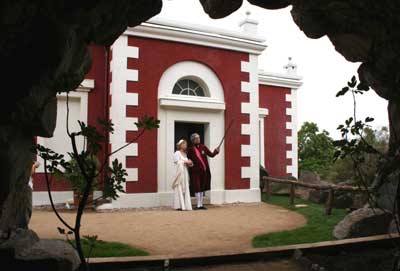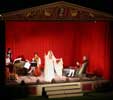
From September 1st - 4th 2005, Lady Hamilton's Attitudes was performed in the amphitheatre on the Felseninsel Stein at Woerlitz, in Sachsen Anhalt, Germany.

It is a long way from Greenwich to Wörlitz near Dessau in Germany. How did an ensemble from Trinity College come to be playing a show about Emma Hamilton there? We owe it to an 18th century friendship of volcano enthusiasts - and also to Google.
 |
In 1800, Admiral Lord Nelson and his friends Sir William and Emma Lady Hamilton travelled home to England via Vienna and Dresden. The notorious ménage à trois, or Tria coniuncta in uno, as they preferred to call themselves (punning on the motto of the Order of the Bath of which both Nelson and Sir William were members), were obliged to travel overland because the scandalised Navy would not let them travel together on a ship. However, the journey had many delights, and meeting Haydn in Vienna and Eisenstadt was undoubtedly one of the most enjoyable: already an admirer of the naval hero, dedicating a setting of the Mass to him which is still known as the Nelson Mass, Haydn became enchanted by Emma’s dramatic and musical talents, and composed especially for her a cantata celebrating Nelson’s great recent victory over the French at The Battle of the Nile. Haydn also accompanied her in his great cantata Arianna a Naxos – he asked his printer Artaria for a copy especially for her. |
 |
|
 |
 |
||
|
There was another interesting encounter on that journey, but one that is hardly documented. The English party travelled by boat down the Elbe from Dresden to Hamburg (where they took ship, finally, for England), and stopped for a picnic breakfast on a small hill not far from Dessau. They were met and entertained by the Prince of Anhalt Dessau, a great friend of Sir William, an admirer of all things English and Italian, and another volcano lover. |
 |
So much so, that he had created an island on a lake at his summer estate in Wörlitz and built on it not only a replica of the Hamilton’s Villa Emma at Posillipo, but an Artificial Vesuvius as well. A working one, with furnaces and chimneys and channels for water that could be made to resemble lava. Alas, there was no time for the English party to visit the estate itself, they had to be content with a view through a telescope of the small but perfectly formed volcano rising above the flood meadows of the Elbe.
|
 |
And this is where Google comes in. To celebrate the bicentenary of Trafalgar I planned a music theatre piece about Emma and Sir William Hamilton. Originally performed at the opening of the 1996 great British Museum exhibition of Hamilton’s collections, Vases and Volcanoes, I rewrote it for the Trinity College ensemble. It features, besides the music of Haydn and his contemporaries, a set of Emma’s classical poses known as her Attitudes. I put up a page about this on my website. Last summer in Wörlitz, Uwe Quilitzsch – too comfortable, he told me, to go and find the reference in the library, googled for Lady Hamilton’s Attitudes and found my webpage, contacted me, and promptly booked the show for the Stein reopening. Consequently, at the beginning of September we performed on four consecutive nights for packed-out audiences including the State Commissioner for Culture from Berlin and the gardening correspondent of the Times.
 |
 |
There may not be a volcano in Greenwich, but instead we have the glorious setting of the Chapel and the thrilling resonances of performing a piece about Nelson and the Hamiltons in surroundings they would have known. The Admiral being away this evening, Sir William and Lady Hamilton (together with a trio of their musicians) are entertaining some friends. The music includes a trio for violin, cello and fortepiano by Haydn, his cantatas on the Nile and Arianna, an arrangement for the trio of the Terremoto or Earthquake from his Seven Last Words from the Cross, and another of Johann Joachim Vanhal’s descriptive Battle of Trafalgar and the Death of Nelson. In between, Emma performs a set of her celebrated Attitudes, and she and Sir William have an animated conversation about life, love, volcanoes, and the Hero.




